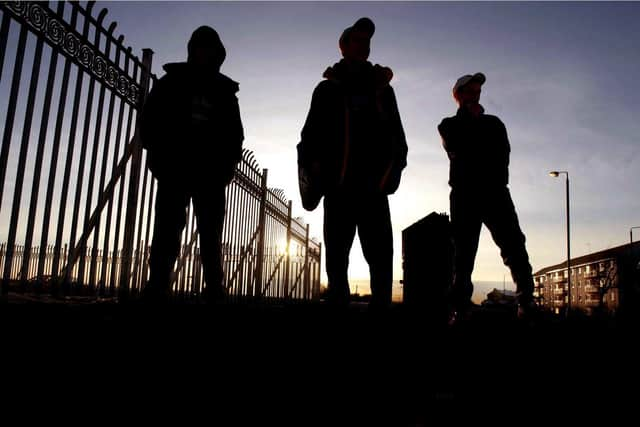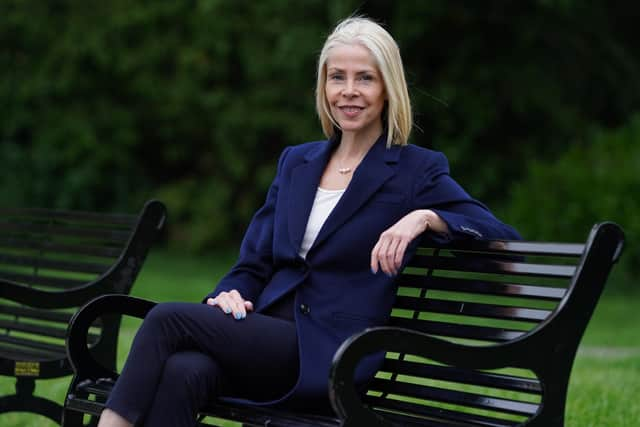Insight: Is violence and disorder on the rise as Scotland recovers from the pandemic?
Even though only a month has passed since the end of the last Covid restrictions, there are tentative signs of growing unrest, with anecdotal reports of escalating anti-social behaviour and violent incidents across the country. In recent weeks, rail workers have threatened to boycott certain routes due to problematic incidents, while some teachers in Glasgow and Dundee have threatened walkouts over pupil violence.
It will take time to determine whether such flashpoints are isolated, or indicative of wider trends. But even at this early stage of our journey out of the pandemic, the reams of official statistics produced by the Scottish Government and Police Scotland may offer a hint - and cause for concern.
Advertisement
Hide AdAdvertisement
Hide AdThe most recent datasets compiled by the government detailing recorded crimes across the country date back to March. While all crime - excluding offences categorised under Covid-19 specific legislation - fell a percentage point compared to the same month in 2020, when the country entered the first lockdown - there are disconcerting spikes in the statistics.
Non-sexual crimes of violence, for example, were 21 per cent higher than they were in March 2020, with crimes classed by Police Scotland as ‘other violence’ up 119 per cent over the same period. Similarly, crimes under the Domestic Abuse (Scotland) Act 2018 were up 45 per cent on 2020.
Such jumps are not isolated. Figures from February and January also show increases in the former two categories over a 24-month period, and although there are important caveats in play - the increase in crimes of ‘other violence’ has been driven in part by a rise in threats and extortion, more than three quarters of which were classed as cyber crimes - it suggests there is preliminary evidence to support the hypothesis that violence is escalating.
Those who have devoted their careers to the study of crime patterns and trends believe an increase is possible, but stress it is too soon to provide definitive answers. Professor Susan McVie, chair of quantitative criminology at the University of Edinburgh’s school of law, said longer term trends were more reliable, and pointed to an uptick in violence in Scotland since around 2014/15.


That rise, she explained, was partly due to an increase in Police Scotland’s recording of online crimes such as threats and extortion, as well as the introduction of the domestic violence act; establishing how much of the spike is attributable to actual increases in crime is complicated, and the same is true when it comes to assessing the emerging post-pandemic landscape.
“There are so many moving parts,” explained Prof McVie, who has advised both the Scottish Government and Police Scotland. “There are issues with staffing resources within Police Scotland right now, which means demand may well be outstripping resources - this could potentially create an increase in crime due to reduced capacity to do preventative work.
“However, it could also lead to a decrease, as much crime is recorded as a result of frontline operational activity.”
Such provisos also apply to incidences of anti-social behaviour (ASB). The most recent provisional data collated by Police Scotland only covers the first three quarters of the 2021/22 financial year, but compared to the same period in 2019/20, there is an upward trend.


Advertisement
Hide AdAdvertisement
Hide AdWhile there were 247,431 ASB incidents reported by the public in the 12 months to 31 December 2019 - just as the first global reports of Covid-19 began to emerge - there were 254,772 such incidents in the year to 31 December 2021, a three per cent rise. Could that simply be down to the fact more people are working from home, and therefore on hand to witness alleged ASB? Perhaps.
But other local authority-level datasets on the same issue throw up alarming anomalies. In Aberdeen, for example there was a 19 per cent jump in ASB incidents over the two-year period. In Glasgow, a city which carries its fair share of stigmas, the number actually fell back by four per cent.
Neither the national nor local datasets on anti-social behaviour is broken down into demographics, but history and expert opinion suggests the trend of offending is driven predominantly by young people. Such a theory is undoubtedly supported by the most recent Scottish crime statistics from British Transport Police, which show that while threatening and abusive conduct has risen by 30 per cent in 2021/22 compared to 2019/20, the spike is significantly higher (63 per cent) when incidents involving under-18s are looked at in isolation.
Those who have closely followed the pandemic’s ruinous impacts are not overly surprised by such figures. Clifford Stott, a professor of social psychology at Keele University, and a member of the behavioural insights group of the UK government's Scientific Advisory Group for Emergencies (SAGE), said the myriad harms suffered by young people were now being played out.


“I think it’s fair to say that young people paid the heaviest price during the lockdowns - they were least at threat, yet gave up job opportunities, educational, and social opportunities,” he said. “They were harmed significantly by the pandemic, and that harm is generating a sense of alienation among the young.
“That’s been amplified by the fact many people of that age have not been in environments where their behaviour has been socially regulated. They’re suddenly let loose into society again with an early form of adulthood power, but without any of the normative socialisation processes that would have been in play pre-pandemic.”
“It’s almost like the perfect storm that’s coming together where their behaviour is becoming problematic.”
Behavioural scientist Linda Bauld, the Bruce and John Usher professor of public health at the University of Edinburgh, said there was a comprehensive empirical base detailing the marked decline in young people’s mental health since the advent of the pandemic, which was vital to understand in the context of any criminality or ASB.
Advertisement
Hide AdAdvertisement
Hide Ad“The latest Covid-19 social study by University College London shows that across a range of indicators relating to mental health, from perceptions of life satisfaction and happiness, trust in government, worries about finances, and depression and anxiety, they are all higher in younger age groups, and markedly higher in some cases,” she explained.


“A lack of confidence in government and lack of trust comes out really clearly, and young people generally just feel less in control of their lives. There is a reasonable hypothesis that coming out of the pandemic, young people have been affected in a way that might affect their behaviour.”
A major challenge for governments across the UK when it comes to assessing and addressing such trends will be determining which drivers are a result of the pandemic, and which are being sparked, or intensified, by the deepening economic woes driving up inflation. “We’re looking at one crisis followed by another crisis,” said Prof Bauld.
Prof McVie said that while the long term impact of the pandemic on crime trends was still under review, it is likely the cost of living crisis could well have an impact on acquisitive crimes such as shoplifting and theft, and that violence may increase as a consequence. “That has been observed in previous economic downturns, however the current circumstances are so unusual that it’s difficult to predict exactly what will happen,” she reasoned.
Whatever the causes, a sense of waning social cohesion is not exclusive to the young. In the first months of the pandemic, there was a sense that one of its few positive legacies was greater togetherness among communities. If that was ever so, it appears the rattling of pot and pans on doorsteps is now but a faint echo.
The most recent fieldwork looking at the impact of Covid in Scotland - commissioned by the Scottish Government and conducted by Ipsos Scotland - found that while most people (63 per cent) feel their neighbourhood has, in general, stayed the same since the start of the pandemic, twice as many Scots (22 per cent) think it has got worse since March 2020 as think it has got better (11 per cent).
Those in the most deprived areas are more likely to say their neighbourhood has got worse (33 per cent) compared with 12 per cent in the least deprived areas, according to the report, published last month.
“I think that sense of community cohesion has probably fallen apart pretty quickly,” said Prof Bauld. “There have been changes in the availability and the functions of public services, and the ScotRail debacle is a good example of that.”
Advertisement
Hide AdAdvertisement
Hide AdOne factor which may be driving that breakdown in cohesion is the succession of scandals which have engulfed those in positions of authority. Stott said the repeated regulation breaches at Downing Street, for example, had given people cause to ask searching questions.
“There’s an underlying dynamic about the legitimacy of the law, and the extent to which people who occupy positions of power comply with that law,” he explained. “What we saw with Barnard Castle has been exposed even more by Partygate.”
That theory is borne out by a sharp decline in our trust of the police. While trust in the Metropolitan Police has been particularly hard hit, public confidence in Scotland’s national force has also plummeted. Having stood at 63 per cent between April and June 2020, the figure has nosedived to just 43 per cent.
The force points out that public confidence is not an indicator of operational performance, and is instead rooted in perceptions of policing both at a national and international level. Even so, the drop is noteworthy.
“It should be a concern to everybody where that level of decline in police legitimacy becomes evident, because that legitimacy and consent is at the heart of our means of exercising authority,” noted Prof Stott.
He expressed concern that the “consistent breaking of the social contract” was feeding a toxic culture of “us and them”, adding: “That is highly dangerous. In a context of ever-increasing economic problems - and it’s more than that, it’s a major decline in our economic capabilities - and the social challenges dealing with post-pandemic impacts, I do think there is a growing potentiality for significant civic disorder as we go across the next few years if we don’t start to get to grips with this issue.”
Prof Bauld said the fundamental issue of a breakdown in trust impacted not just on the police, but nearly every branch and agency of government. “Leaders being seen to be hypocritical and have double standards undermines trust, and it’s just about whether you trust the party in government, it’s whether you trust the state, whether it be the police or local government,” she explained.
Does she concur with Prof Stott that there could be greater unrest? “If people are not obtaining the resources they need to live, and they are struggling, and there is hardship, which we are definitely facing in terms of the fuel and food crisis even though unemployment is low, then of course, you see across the world that it contributes to social unrest.
Advertisement
Hide AdAdvertisement
Hide Ad“It’s really important that governments do what they can. When people feel disenfranchised and are struggling for a variety of reasons, people will express that in a number of ways - some groups will express it quite publicly.”
Others believe it is too early to say whether a loss of trust could lead to disorder. Prof McVie, who closely scrutinised public compliance with regulations in the midst of the pandemic, said the breaches witnessed were not due to people fundamentally changing their moral codes. Rather, she said, it was down to “a combination of poor legislation, lockdown fatigue and a rational choice to break what were often considered to be pointless rules and pay the consequences”.
She added: “I doubt very much that the Downing Street parties will have a long-term effect on compliance with the law – the majority of people remain law-abiding and support the legitimacy of the rule of law.”